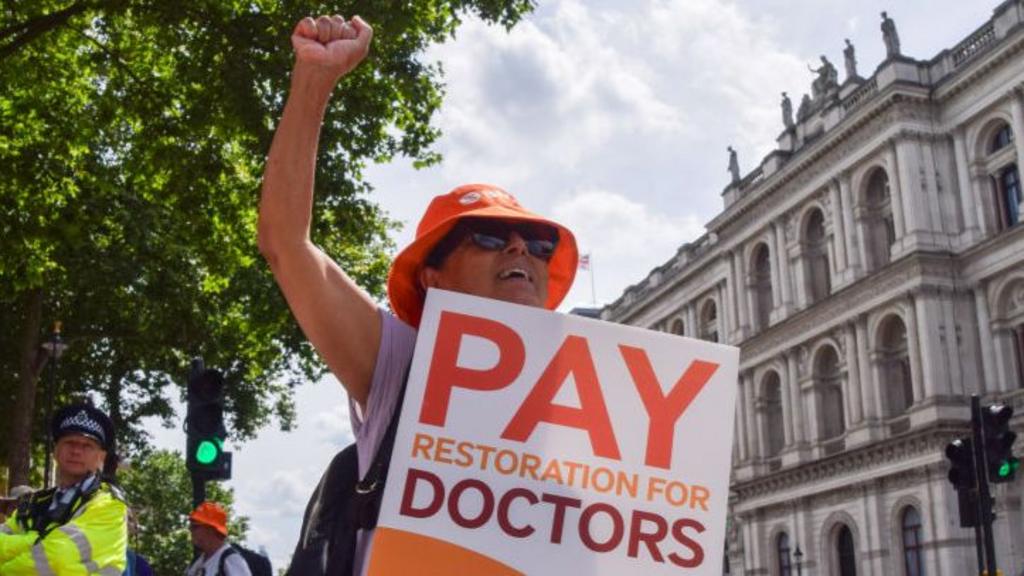“`html
Negotiations between Health Secretary Wes Streeting and the British Medical Association (BMA) are slated to occur next week, aiming to prevent potential strike action within England’s National Health Service (NHS).
Resident doctors, formerly known as junior doctors, announced earlier this week their intent to strike for five consecutive days, commencing on July 25 and concluding on July 30, in response to an ongoing pay dispute with the government.
The government maintains that it is unable to enhance its current offer of a 5.4% increase for the present year.
In a joint statement, Dr. Ross Nieuwoudt and Dr. Melissa Ryan, co-chairs of the BMA resident doctors committee, expressed their willingness to engage in continued dialogue to reach a resolution.
They stated: “We welcome the Secretary of State’s acceptance of our offer and anticipate constructive discussions, with the hope of achieving sufficient progress to warrant suspending the planned strike.”
Resident doctors received an average 5.4% pay raise for this financial year, to be reflected in paychecks starting in August, following a 22% increase over the preceding two years.
The doctors contend that their real-term pay remains approximately 20% lower than it was in 2008 and are urging the government to establish a pathway to restore its value.
They argue that the current 5.4% increase does not adequately address this disparity.
Sources within the Department of Health have indicated to the BBC that while the Health Secretary is sympathetic to improving working conditions for resident doctors, he remains firm on the issue of salaries.
Following the BMA’s strike announcement, Mr. Streeting characterized the strike as “unnecessary and unreasonable,” adding: “The NHS is hanging by a thread – why on earth are they threatening to pull it?”
He affirmed the government’s “readiness and willingness” to collaborate with the BMA, but cautioned that further strike action would be detrimental to patients and would hinder progress in reducing waiting lists in England.
In announcing the strikes on Wednesday, Dr. Ryan and Dr. Nieuwoudt stated that doctors had been left with “no choice” in the absence of a “credible offer to keep us on the path to restore our pay”.
Lord Robert Winston, a professor, television doctor, and pioneer of IVF treatment, resigned from the BMA on Friday in response to the planned strikes.
In an interview with The Times, he cautioned against strike action, asserting that it could erode public trust in the profession.
This development coincides with new polling data from Ipsos, initially reported by the Guardian, indicating a decline in public support for resident doctors’ industrial action, from 52% to 26% since their last strike in June of the previous year.
Resident doctors participated in 11 separate strikes throughout 2023 and 2024.
To resolve previous strikes last year, the incoming Labour government awarded a backdated increase equivalent to 22% over two years.
The action in England will not extend to resident doctors in Scotland, Wales, or Northern Ireland, who negotiate pay directly with their respective devolved governments.
Basic salaries for resident doctors in England range from £37,000 to £70,000 annually for a 40-hour work week, contingent upon experience, with supplementary payments for night shifts and weekend work.
This excludes the recent 5.4% average pay increase for the current year, which will be implemented in wage packets starting in August.
A coroner says Andrew Tizard-Varcoe received “less than optimal” care before he died.
The service is expected to be fully in place by October, NHS Shropshire, Telford and Wrekin says.
A hospital in Peterborough is planning to expand into a “health village” with dentists and doctors.
Robert Jones and Agnes Hunt Hospital in Gobowen blames operational capacity issues for treatment delays.
One Spennymoor man waiting for an assessment says it is making his symptoms worse.
“`

